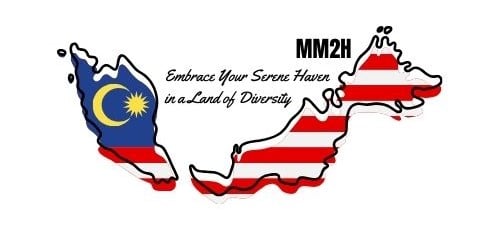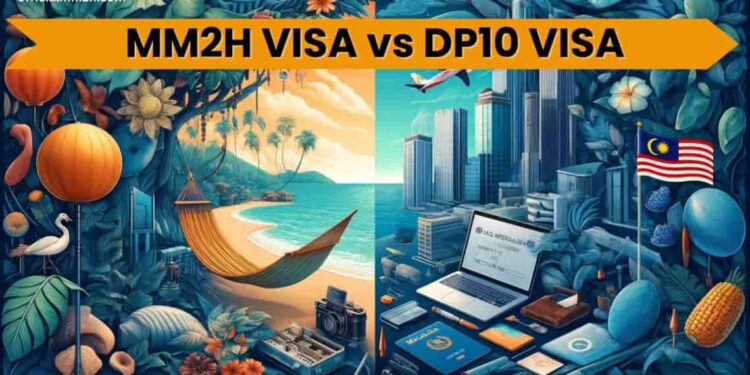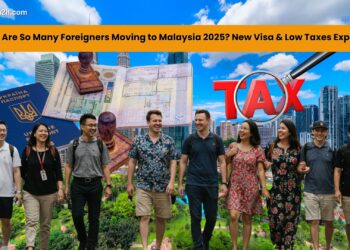Comparing MM2H vs DP10 Visa In Malaysia: Which Second Home Option Is Right For You?
Exploring the myriad of visa options for settling down in Malaysia felt like a maze at first glance. My journey into the depths of research revealed crucial details about the MM2H and DP10 visas that I think could light the way for others standing at this crossroads.
In this post, we’ll compare these two routes to making Malaysia your new home, highlighting their advantages and disadvantages. Stick around to discover which one aligns best with your aspirations!
Key Takeaways
- MM2H lets people from all countries live in Malaysia for up 5 to 15 years depend on your category. I
- DP10 is for those who want to work in Malaysia or start a business there. You must have a job offer or own a company and follow steps like showing your bank history and maybe getting extra licenses.
- For MM2H, you show how much fixed deposit in a Malaysian bank. DP10 needs proof of job skills or business ownership.
- MM2H offers a long stay without the need to work but limits on working locally; not taxed for foreign income. DP10 allows full employment rights but is temporary.
- Choose MM2H if looking for long-term stay without working norms; choose DP10 for opportunities related to employment or starting your own business in Malaysia.
Exploring MM2H vs DP10 Visas in Malaysia
In Malaysia, we’ve got two cool paths for people from other countries to stay here. One is the MM2H program, which means “Malaysia My Second Home.” It lets folks live in Malaysia for a long time.
The other is the DP10, also known as an Employment Pass. This one is for people who want to work here. Both of these ways have their own rules and perks, so picking between them depends on what you need – a chill place to stay or a chance to work and live in Malaysia.
MM2H: The Malaysia My Second Home Program

The MM2H program lets people from other countries live in Malaysia for up to 5-15 years renewable visa. It’s like saying, “Sure, come make Malaysia your second home!” This government-backed initiative is open to citizens of all places, no matter where they’re from.
To join in, you must at least 30 years old and show have money saved or invested that’s worth at least RM500,000 (this is for silver category).
And it’s not just you flying solo! You can bring your partner and unmarried kids under 21 along for the adventure.
Malaysia My Second Home: Not Just Living but Belonging.
On top of showing the cash proof, everyone has to pass a medical check-up and sign up for health insurance that covers them in Malaysia. Picture living near beautiful beaches or getting lost in bustling cities like Kuala Lumpur without stressing over visa runs every few months.
That said, while you can enjoy long stays and even open bank accounts as an MM2H participant, working locally comes with limits. But hey, if soaking up Malaysian culture from a more permanent base sounds right up your alley—while maybe doing some remote work or enjoying retirement—this could be your golden ticket! To know more about latest requirements, please visit this article.
DP10: The Malaysia Employment Pass

DP10, or the Malaysia Employment Pass, is a ticket for experts to work in Malaysia. It’s like your all-access pass if you got skills and a job lined up with a company here. Before starting this adventure, I need to make sure I have an offer letter from a Malaysian employer.
Plus, owning a business isn’t off-limits either — I just must start my own private limited company and keep it running smoothly for at least three months.
Securing this professional visa also means dealing with some paperwork that tells them about my job role and how much capital my business has. And oh! If my business sells goods directly to folks, I might need an extra license called WRT.
So yeah, it’s not just grabbing your bags and moving; there are these steps to climb but envision the view from the top – getting to live and thrive in amazing Malaysia.
Analyzing Eligibility Criteria for Each Visa

Figuring out if you can get a visa can feel like solving a puzzle. Each visa, MM2H and DP10, asks for different things from you. The MM2H needs to know about your money and how old you are. For the DP10, it’s all about what job skills you have or if you run a company. So, we’re talking serious business when deciding which one fits your life best in Malaysia. It’s not just about packing your bags and moving; it’s checking if the pieces fit first!
MM2H: Age and Financial Requirements
I’m looking into the MM2H program because I want to make Malaysia my second home. The MM2H visa has clear age and financial rules that I need to follow.
- At least 30 years old, you must show at least RM500,000 fixed deposit in Malaysia bank (this is for silver category, there is gold category and platinum category, you can refer here for Federal MM2H requirements). This shows you can live well in Malaysia without working there. Must reside for at least a cumulative total of 60 days a year in Malaysia.
- Everyone applying needs to provide recent bank statements. These papers prove that you really have the money and income you claim.
- These rules help the Malaysian Immigration Department know who can afford to live in Malaysia without working illegally.
- They can withdraw a maximum of 50 per cent of the amount after a year to purchase properties valued at RM750,000 and above, for healthcare, and for spending on tourism activities.
So, that’s what I’ve found out about the MM2H age and financial requirements so far. It seems pretty straightforward but also strict on proving financial stability.
DP10: Professional and Business Qualifications
The DP10 Professional and Business Qualifications make it stand out as the go-to choice for expatriates aiming to work in Malaysia, also known as Expatriate Visa or Director Visa. It’s focused on proving you have what it takes—skills, experience, and the right setup for your business. Applicants need to be between 27 and 50 years old, with additional documentation required for those under 27. It permits applications for dependent passes for your immediate family. To qualify, ensure your Malaysian company is properly set up with a paid-up capital ranging from RM 500,000 to RM 1,000,000, depending on ownership and industry type. Your company must also hold a minimum of RM 500,000 in foreign-owned shares.
Here’s a breakdown of what you need to know:
- First off, you must have a job offer in hand. This is non-negotiable. A company in Malaysia needs to confirm they want you aboard.
- Setting up a private limited company (Sdn Bhd) is essential if you’re coming to run your own show. This step shows commitment and roots in the Malaysian market. You must first register and form a company with the Registrar of Companies (SSM). It’s advisable to get assistance from a company secretary for this process.
- You’ll need a tenancy agreement to prove you have a legitimate office space or place of business here. It’s not just about having an address; it’s about showing that your business has a physical presence. Secure an office space with a tenancy agreement and apply for a local council license and an office telephone line. These are crucial for applying for the expatriate visa.
- Opening a bank account comes next. This move is vital for handling your finances in Malaysia and shows financial institutions trust you. Open a company bank account and maintain it for at least three months before applying for the visa.
- Industry and shareholder records aren’t just paper; they testify to your business standing and stake in the company.
- The requirement for paid-up capital demonstrates your investment capability and financial strength, ensuring you’re serious about your enterprise.
- And let’s not overlook the WRT license—a necessity that signals your business complies with local regulations and is ready to operate within specific industries.
- Approval from Relevant Ministries: Depending on the sector your business operates in, you’ll need to obtain approval letters from relevant ministries such as the Ministry of Tourism, the Ministry of Health, or the Ministry of International Trade and Industry, among others.
- Work Permit Application: Submit the employment pass application along with required documents like passport size photos, resume, and educational certificates. The application process involves obtaining an approval letter from the Expatriate Services Division (ESD), which then issues a calling visa allowing the expatriate to travel to Malaysia.
- Financial Requirements: The company needs to have a paid-up capital ranging from RM500,000 to RM1,000,000 depending on the type of business.
- Salary Thresholds: There are different categories based on the salary:
- Category 1: RM10,000 and above for top managerial positions like CEOs and directors (employment contract up to 5 years)
- Category 2: RM5,000 to RM9,999 for middle management positions like managers and engineers (employment contract up to 2 years)
- Category 3: RM3,000 to RM4,999 for semi-skilled positions (employment contract must NOT exceed 12 months)
- Dependents: Only holders of Category 1 and 2 permits can apply for dependent visas for their spouse and children under 18 years old.
- Validity and Renewal: The initial validity of the pass is 1 or 2 years, which can be extended. The entire application process from submission to receiving the calling letter takes about 12 to 16 weeks.
Each of these points plays a necessary role in shaping your future here under the DP10 visa scheme, guiding professionals towards achieving their goal of working legally in Malaysia. To apply, go to the ESD website, log in through the company’s ESD account, and submit the expatriate application or visit here for detail https://esd.imi.gov.my/portal/expatriates/myxpats/key-services/employment-pass/
Comparing Benefits and Limitations
When we look at the perks and downsides, MM2H offers a long stay but limits jobs you can do. On the other side, DP10 lets you work freely but doesn’t let you stay as long.
MM2H: Long-term Residence with Limited Work Rights
So, I found out about MM2H. It lets people live in Malaysia for a long time. But, there’s a catch – you can’t work like you normally would. You can still do some things like part-time working (for 50 years old and above) or putting money into the stock market.
This visa is cool because you don’t have to pay taxes on money you bring from another country. And if you get pension money from outside Malaysia, that’s not taxed either. This tax exemption applies as long as the funds remain offshore and are not remitted into Malaysia. This policy makes the MM2H visa quite attractive for retirees or anyone looking to maintain financial ties outside of Malaysia while enjoying the benefits of residing there.
I also learned that with this program, buying houses is an option. But applicants allowed to withdraw a maximum of 50 per cent of the amount after a year to purchase properties valued at RM750,000 and above, for healthcare, and for spending on tourism activities.
To join MM2H, people must show they have enough money and meet some other rules the immigration department of Malaysia set up.
I think it’s a neat way to live in another country without having to commit to full-time work there.
DP10: Employment Rights with Temporary Residency
I need to work in Malaysia. The DP10 visa is my ticket. This pass lets foreigners get jobs there. First, I have to find a job and get an employment letter from the company. If I want to start my own business, I must set up a private limited company.
The government needs to see my bank history for three months before saying yes. Once they do, I can stay in Malaysia but only for a while because it’s temporary residency here. It’s centered on working legally as an expat with this employment pass visa.
Determining the Suitable Visa for Your Requirements
Choosing the right visa depends on what I need. If I want to live in Malaysia without working, MM2H is great. It lets me stay for 5-10 years. I can invest and even buy a house or car here.
Plus, I don’t have to pay tax on money from other countries.
For work, the DP10 visa fits better. It’s for jobs or starting a company in Malaysia. Before applying, I must have a job offer or own a company here.
The best visa matches what you plan to do in Malaysia.
Conclusion
Picking the right visa between MM2H and DP10 depends on your plans in Malaysia. If a long stay without working fits your plan, MM2H might be the way to go. This option lets you live there more permanently, enjoying life at a slower pace.
On the other hand, if work is on your agenda or setting up a business excites you, then the DP10 sounds like your match. It’s perfect for those eager to enter Malaysia’s job market or start something new with local partners.
My choice? It really depends on my goals – a peaceful retirement with occasional travel back home goes well with MM2H; ambitious business plans call for a DP10. What’s yours?




